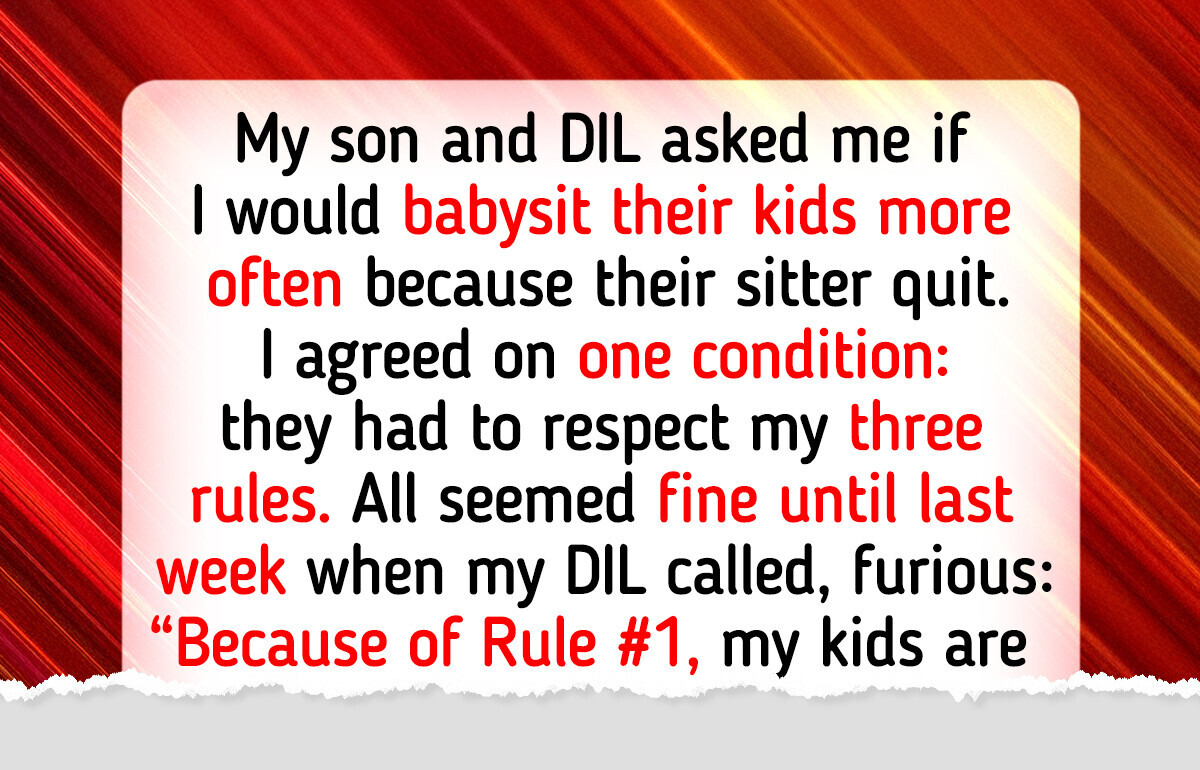your rules are ridiculous anyway
I’ll Babysit My Grandkids for Free, but They Have to Follow My Rules, Whether My DIL Likes It or Not

Becoming a grandparent opens a whole new chapter of love and chaos. Those little ones steal your heart (and sometimes your sanity) with stories you couldn’t invent if you tried. But as one reader recently discovered, the sweetest moments can also come with a few unexpected twists.
Teresa had a story to tell.
Dear Bright Side,
I have three wonderful grandchildren who mean the world to me, but keeping up with them isn’t as easy as it once was. I’m 62 now, retired, and my energy isn’t what it used to be. No matter how much I adore them, it’s become a challenge to match their pace.
Still, I’ve always made an effort to babysit whenever I could. It’s time I truly treasure, but things recently took a turn. My son and daughter-in-law asked if I could start watching the kids more regularly since their usual babysitter had to step away.
I didn’t answer right away. I thought about it carefully and told them I’d be happy to help on one condition: they’d have to agree to a few new ground rules. My son wanted to know what those rules were, so I explained.
Rule #1: No bedtimes at Grandma’s house. They’ll sleep when they’re tired, usually around midnight. Rule #2: Homework can wait until morning. Brains need rest to grow.
Rule #3: Dessert before dinner. Life’s too short not to start with ice cream.
My son laughed at my rules but gave a mischievous nod of approval. So we settled on me babysitting the kids twice a week. At first, everything went smoothly, and the kids followed the rules without complaint. But last week, my daughter-in-law called, furious about all my rules, especially #1.
“Because of you,” she yelled, “my kids are acting out in ways they never did before.” She ranted that the kids were exhausted, grumpy, demanding sugar constantly, and getting in trouble at school for unfinished homework. When she discovered my “rules,” she held me entirely responsible. I calmly told her that my son had agreed to them beforehand, so I didn’t see any issue.
Later that evening, my son called me. He said my daughter-in-law had gotten extremely angry after I told her that he’d agreed to the rules. They’d ended up having a huge fight, and now he was upset with me for speaking up. I apologized, but gently pointed out that he had agreed to them. He said he thought I was joking. Honestly, how was I supposed to know?
I haven’t heard from them or seen them since, and now I’m questioning myself. Bright Side, was it wrong to stick to my rules, or should I have just let my son and daughter-in-law run things in my own home?
Warm regards,
Teresa
Thank you for reaching out to us, Teresa. We understand how difficult this situation must be so we’ve put together a few tips that might be helpful.
Keep your fun rules, but agree to let your DIL set a few ground rules too.

Those rules are rediculas exspecially when their already use to a spacific schedule that works for the kids. And thete not cranky from being tired and a bad stomach from to much sugar and grades slipping from not doing homework. Not putting kids well being first. You just wanted to be a lazy gma. And you got your son and dil fighting in the same house as the kids and they shouldnt hear the fighting when theyre not use to hearing the yelling and fighting. You caused an up roar in there home your at fault
It’s important to have your own style when babysitting, and there’s nothing wrong with a few fun, unconventional rules to keep things lively. At the same time, your daughter-in-law knows her children’s routines and limits. Finding a balance helps prevent conflict and keeps everyone happy. Let her set a few ground rules, while you maintain your playful traditions. This way, the kids enjoy the best of both worlds, and family visits stay fun and peaceful.
Calmly but firmly outline the reasons for your quirky rules.

As a parent, would YOU have let your mother keep your kids up later than their normal bedtime? Would you let them not finish their homework while at Grandma's? Would you let her give them too much sugar? If you said no, to any of these questions, why would you expect your DIL to say yes? If you said yes to them, you must have been very unconcerned about your kids well-being. If however this is happening DURING THE SCHOOL WEEK, WHY IS IT? Do your son and DIL work overnight shifts? Lots of questions about a lot of things. Mostly though, it seems like you are trying to be loved by letting your grandkids not be responsible for anything. Real life doesn't work like that, and you know it. Weekends are for fun with Grandma, vacations are for fun with Grandma, weekdays are for learning at school and a normal routine. Sorry Grandma, they can love you WITHOUT being turned into monsters around others, and it sounds like they are going in that direction.
When you set quirky or fun rules, it helps to explain why they exist. Calmly and confidently share your reasoning, whether it’s to encourage creativity, make routines enjoyable, or simply to add a little laughter to the day. Being clear and steady shows you’re not just making rules for fun; you have a purpose. This approach will help your DIL understand your perspective and reduce potential conflicts while keeping babysitting enjoyable.
Lend a hand in solving the problems that arose from your rules.
If your fun or quirky rules end up causing friction, offer to help fix the fallout. Whether it’s helping with homework, calming cranky kids, or smoothing over conflicts, showing that you’re willing to pitch in demonstrates responsibility and care. Taking an active role not only eases the burden on your daughter-in-law but also teaches the children cooperation and accountability, turning a tricky situation into a chance for connection.
Teresa is facing a tricky situation, but it’s far from impossible to resolve. A little empathy and patience can make a huge difference here. Still, she’s not alone. Many babysitters deal with similar challenges and conflicts.
Other readers have reached out to share their wild babysitting stories. Read them here: 10 Times Babysitting Turned Into a Real-Life Nightmare.
Comments
Related Reads
I Turned My Adult Daughter Away at My Door, She Needed to Hear “No”

14 Stories That Show Kindness Stands Tall When Life Gets Heavy

14 Stories That Show the Raw Reality of Kids Caring for Their Aging Parents

I Refused to Watch My DIL Give Birth— She Made Sure I Regretted That Moment

My Cousin Uninvited Me to Save Money—My Petty Revenge Was Absolutely Worth It

15+ Stories That Prove Some House Guests Are Impossible to Forget

15 Stories That Prove Some People Live in a World With Totally Different Logic

15 Moments That Prove Kindness and Mercy Are Quietly Saving the World

16 Stories That Prove a Dad’s Love Is the Most Powerful Magic in the World

My MIL Humiliated Me in Front of Family, So I Exposed Her Secret

10 Hospital Workers Who Prove Kind Heart Is a Powerful Medicine

15 Heart-Centered Moments of Human Kindness That Only Happen Once in a Blue Moon




